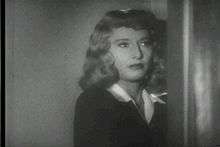Phyllis Dietrichson

Phyllis Dietrichson (Phyllis Nirdlinger, in the book) is a fictional character in the book and two film adaptations of James M. Cain's novella Double Indemnity. In the 1944 production, she was played by Barbara Stanwyck.
Stanwyck was nominated for the Academy Award for Best Actress for her performance in the film version. Stanwyck's portrayal of Dietrichson is considered one of the best Femme fatale roles in Film noir history.[1][2]
The character was ranked as the #8 film villain of the first 100 years of American cinema by the American Film Institute in the AFI's 100 Years... 100 Heroes and Villains.[3]
Character biography
In both the novella and films, she manipulates her husband's insurance agent, Walter Neff (Fred MacMurray in the 1944 production) to help her murder her husband. They first trick her husband, Mr. Dietrichson into signing a life insurance policy without his knowledge. The policy has a double indemnity clause whereby the company agrees to pay the stated multiple (i.e., double) of the face amount in the contract in cases of death caused by accidental means. They then murder her husband and try to make it seem like an accident on a train in an attempt to invoke the policy’s double indemnity clause. Though they succeed in the deed, Phyllis soon runs into several problems in trying to invoke the clause and collect the money.
The next day much to her dismay, Phyllis finds out that the company has refused to pay the double indemnity clause for they didn't know about Mr. Dietrichson's broken leg before his death. Their suspicions catches the attention of Neff's boss, Barton Keyes, who encourages them to investigate the whole thing, making both her and Neff nervous. Phyllis realizes too late that Dietrichson eventually found out about her plan to murder him and had left the inheritance to his daughter (her stepdaughter), Lola. She knows her stepdaughter is a threat to her because Lola suspected her of murdering her father in a similar manner to her mother and tries to get Neff to kill her (which fails after he befriended Lola and learned more about her family's tragic past). Phyllis must also contend with the inquisitive Keys who also suspects she was involved in the murder of Mr. Dietrichson and had an accomplice in Nino, due to them secretly seeing each other. She tries to kill Neff to clean up any loose ends, but she is shot and killed herself in the ensuing struggle.
Casting
The Dietrichson character was so iniquitous that Stanwyck, director Billy Wilder's first choice for the role in the 1944 version, was reluctant to take it. Wilder was persistent, however, and Stanwyck eventually relented; she said thereafter it was one of the best roles she had ever played.[4]
Novel vs film
in James M. Cain's original novella, the character is named Phyllis Nirdlinger (Wilder changed the name for the film adaptation, as he thought it sounded too comical). In the novella, Phyllis is a former nurse who was suspected of killing several children in her care; the case was dropped for lack of evidence. Also, in the novel's climax, she escapes with Neff (here called Huff) and goes away with him on an ocean liner; there, she kills him, too. It is implied at the end of the novel that she will be arrested.
Details
- The character was based upon real-life murderer Ruth Snyder.[5] The photo of Snyder's execution in the Sing Sing electric chair, run on the cover of the January 13, 1928 New York Daily News with the one-word headline DEAD!, has been called the most famous newsphoto of the 1920s.[6]
In other media
Samantha Eggar portrayed Dietrichson in a 1973 made-for-television remake.[7]
References
- ↑ History of American Cinema accessed 1-4-2016
- ↑ iconic role accessed 1-4-2016
- ↑ AFI List accessed 1-4-2016
- ↑ Phillips, Gene D. (2010). Some Like it Wilder: The Life and Controversial Films of Billy Wilder. Lexington: University Press of Kentucky. pp. 54–63. ISBN 978-0-8131-2570-1.
- ↑ "Shadows of Suspense". Double Indemnity Universal Legacy Series DVD. Universal. 2006.
- ↑ Gallo, Bill (2005). "When 'Dem Bums' Were Kings," New York Daily News, October 4, 2005.
- ↑ The Double Indemnity murder accessed 1-4-2016